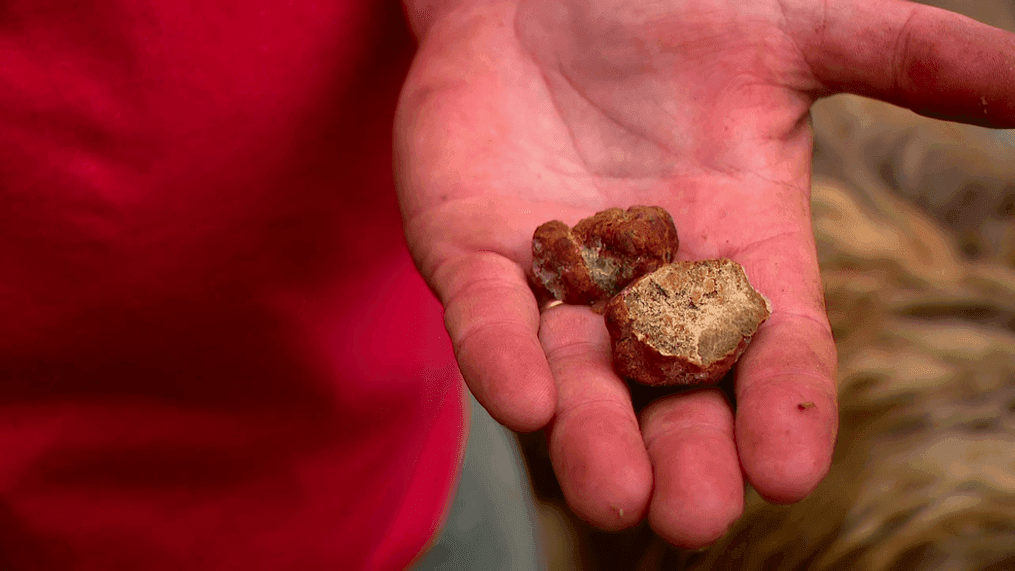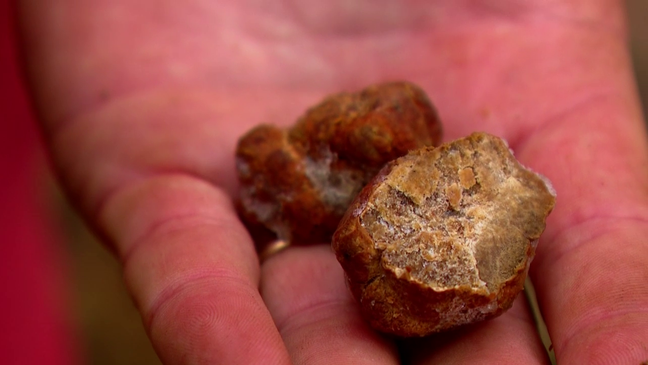Hurry up and wait: Truffle farmer shares process of growing delicacy in mountains of NC
FLETCHER, N.C. (WLOS) — Farming is nothing new for Western North Carolina, but sometimes you’ve got to try something just a little bit different.
In Fletcher, there’s one farm that’s moving its operation underground.
“We used to have a whole sale nursery here,” says Brian Upchurch who's been working with plant life of all kinds for years. The land he’s referring to still fosters an assortment of trees and plants. Once he sold off the nursery, he says his son wanted to do something with the farm.
His son came up with an idea: truffles.
It was a new adventure for the farm and a learning experience for Brian and his team.
'FUNGUY' WITH PASSION FOR MUSHROOM CULTIVATION SHARES KNOWLEDGE & HARVEST WITH COMMUNITY
“We’re growing a symbiosis," he says. "It’s not just the host tree, it’s not just the truffle, it’s their interaction.” It's an interaction that will hopefully lead to a new outlook for the delicacy as well as a new appetite for domestically grown truffles. “It’s not enough to produce a truffle, we want to produce commercial quantities to make it viable.”
Brian and his small crew at Carolina Trufferies believe that quality, North American grown truffles can be a viable option for professional and amateur chefs alike.
“It’s a very perishable product," he says. "It has a very limited shelf life. Once it’s frozen it loses value and the attributes that make it desirable. So, the idea is if we can bump up production and get it to market quicker, which given that it doesn’t have to come through customs or import and so forth which is also an added expense for imported truffles. Growing truffles domestically would mean putting a fresher product on tables across the country. The downside is that there’s no supply chain to speak of in the U.S.”
Brian isn’t letting that stop his progress. He’s also learning about truffles most known for growing in European countries that will thrive in North Carolina.
“Most of the research, which is limited, has mostly been in Europe and they’re working with European host trees, European soils, their climate which is different than ours," he explains. "So, we have to adapt to our climate here and the host trees we’re using.”
Inside his greenhouse he shows off one of those trees.
NORTH CAROLINA'S MYSTERY HILL PULLS PEOPLE IN AS 'QUIRKY LITTLE PIECE OF ROADSIDE AMERICA'
“This is a hybrid chestnut. It’s virtually all native American chestnut and enough Chinese chestnut to include resistance to the chestnut blight and we think this is going to be a really good host.” The chestnut may prove to be a good host, but to get to harvest one has to have patience, Brian says.
“It can be six to eight years for Tuber melanosporum which is the the black Perigord truffle."
But the waiting doesn’t phase Brian and his team. They’re even expanding their operation. They’ve already expanded to another, much larger farm, which could end up being one of the largest truffle farms in the country. And while he’s confident that truffles will be a huge success, Brian will be the first to tell you, “It’s exciting. But, you know, it’s a lot of hurry up and wait, because you just don’t know what’s going on underground.”
You can find more information about Carolina Trufferies below:




